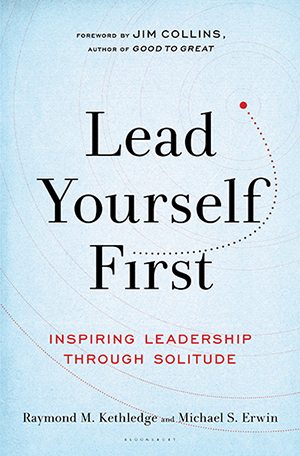Embracing Solitude
Leaders have a responsibility to seek out periods of being alone.
By Raymond M. Kethledge and Michael S. ErwinSolitude has been instrumental to the effectiveness of leaders throughout history, but now they (along with everyone else) are losing it with hardly any awareness of the fact. Before the Information Age—which one could also call the Input Age—leaders naturally found solitude anytime they were physically alone, or when walking from one place to another, or while standing in line. Like a great wave that saturates everything in its path, however, handheld devices deliver immeasurable quantities of information and entertainment that now have virtually everyone instead staring down at their phones. Society did not make a considered choice to surrender the bulk of its time for reflection in favor of time spent reading tweets or texts.
Yet, with an awareness of what we have lost, each of us can choose to reclaim it. And leaders in particular—whose actions by definition affect not only themselves—have more than a choice. They have an obligation. A leader has not only permission, but a responsibility, to seek out periods of solitude. What follows are some ways to use it productively.
What to Focus on in Solitude
Embrace hard thinking. Even during time alone, it is easy for a leader to fool himself and everyone else into believing that he is doing substantive work when in fact he is merely reviewing superficial correspondence or performing functions that are almost ministerial. A leader should use solitude to identify his highest-value functions and then to do them. Among the most valuable functions a leader can perform is hard thinking about complex problems: identifying the problem precisely, making the premises of his thought explicit, and then examining each link in his logical chain—ideally all done on a notepad. There are fewer distractions that way.
Sometimes complex problems concern the organization as a whole. A leader who has not thought hard about those problems will favor off-the-rack solutions that are the leadership equivalent of the latest diet fad. Or the leader will offer only vague guidance to subordinates—“reassess this from a different angle,” or “this needs to be buttoned up more”—because the leader himself lacks a clear idea of what he is looking for. A leader who embraces hard thinking can lead himself, and then others, through the process of finding effective solutions.
Other problems arise from the complex dynamics of interpersonal relationships. Solitude allows a leader to think carefully about what a particular subordinate needs, what that person might be worried about, or where the leader himself has fallen short in their relationship. A leader who reflects on his subordinates’ well-being will enhance their effectiveness and earn their loyalty.
Identify your first principles and stay connected with them. A leader’s first principles are the wellspring of all the benefits that solitude provides: clarity, creativity, emotional balance, and moral courage. A leader out of touch with his first principles will eventually run short of all these things. With a lack of direction internally, he will become directed externally. He will find himself governed by optics. He will have an uneasy awareness of a gap between what he thinks he believes and what he in fact chooses to do. The gap itself will reveal a lack of clarity in his thinking. And when others see the gap—when they say he is phony or hypocritical, and discount his leadership accordingly—he will have nothing to draw upon inside.
An authentic leader finds herself on different ground altogether. A leader who identifies her first principles and then periodically measures her actions against them is likely to act in accordance with them. That kind of leadership is inner-directed; and an inner-directed leader is unlikely to be diverted by moral criticism or praise. That is not to say a leader should be closed-minded: an effective leader will consider criticism on its merits, and when the critics have a point, she will act upon it. For the leader who has reflected deeply on her first principles, however, the criticism or praise that ultimately matters most is her own.
It is only this kind of leader—clear, balanced, courageous—who truly leads.
Find a higher purpose for your leadership, and share it with your followers. The most inspiring leaders are ones who find some transcendent meaning in the enterprise they lead. That meaning might spring from shared first principles, as it could for any organization that shares them in earnest. It might spring from a sense of shared injustice, or the realization that suffering confers dignity, or an awareness that honest labor does as well. Or it might spring from the devotion that a group’s members share for one another. A transcendent meaning is one that by definition stands apart from the specific goals at hand. To find it, therefore, usually requires reflection.
The leaders who do find it are the ones we honor most.
Raymond M. Kethledge is a judge on the United States Court of Appeals for the Sixth Circuit. He formerly served as a law clerk to Justice Anthony Kennedy and to Judge Ralph B. Guy Jr., and founded his own law firm with two partners.
Michael S. Erwin is a graduate of West Point and served two tours in Afghanistan and one in Iraq. He now serves as the CEO of the Character & Leadership Center and the president of The Positivity Project. He is also the founder and chairman of Team Red, White & Blue, a veteran-support non-profit with more than 100,000 members nationwide. Mike continues to serve as a Major in the Army Reserves and is an assistant professor in Leadership and Psychology at West Point.
This excerpt is adapted from Lead Yourself First: Inspiring Leadership Through Solitude by Raymond M. Kethledge and Michael S. Erwin. Reprinted courtesy of Bloomsbury Publishing. Copyright 2017 Raymond M. Kethledge and Michael S. Erwin.
Photo courtesy of unsplash.com

